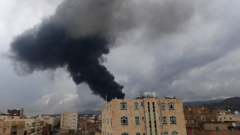The Integrated Food Security Phase Classification identifies half a million Palestinians in Gaza facing famine due to systemic blockades and mismanagement of aid.
How Man-Made Policies Are Leading to Famine in Gaza

How Man-Made Policies Are Leading to Famine in Gaza
A recent report reveals that policies have precipitated a dire humanitarian crisis in Gaza.
Famine-like conditions have been reported in Gaza, with hundreds of trucks loaded with aid stranded outside its borders. The Integrated Food Security Phase Classification (IPC), a leading hunger monitoring body supported by the United Nations, has reported that approximately half a million people, about a quarter of the population in Gaza, are experiencing severe food shortages and malnutrition. The IPC has described these circumstances as "entirely man-made," attributing the crisis to obstructive policies implemented by Israel regarding aid distribution, which many humanitarian organizations claim are systematically preventing food from entering Gaza.
Reports from residents illustrate the grim reality as families struggle with starvation and malnutrition. IPC's findings reveal alarming statistics, including that one in five households faces extreme food shortages, and one in three children are acutely malnourished. The report emphasizes that the mortality rate due to starvation and related illnesses is exceedingly high, with concerns that the actual number of fatalities may be significantly under-reported due to the collapse of health monitoring systems.
Though officials in Israel, including Prime Minister Benjamin Netanyahu, have dismissed claims of famine, blaming aid organizations for failing to distribute what is available, the evidence suggests a compounded problem of access and deteriorating conditions. The situation escalated sharply following the onset of war on October 7, 2023, drastically reducing available supplies and leading to a complete blockade since March 2025.
As international pressure mounted, Israel allowed some relief efforts starting in late May. However, the new distribution system, coordinated by an American organization called the Gaza Humanitarian Foundation, poses additional challenges. With the number of distribution points significantly reduced, many Palestinians now risk their lives to access aid at militarized zones, resulting in increased violence and fatalities, with numerous reports citing shootings by military personnel safeguarding aid routes.
While some aid has been permitted entry, it remains grossly insufficient; aid organizations state that an influx of about 600 trucks daily is necessary to meet basic needs, yet current deliveries remain around half this amount. Recent attempts at providing assistance through air drops have also been criticized for their inefficacy.
Israel's narrative attributes responsibility for the humanitarian crisis to Hamas, but evidence suggests that most looting of aid is being carried out by desperate civilians rather than organized groups. The IPC and various humanitarian organizations continue advocating for unrestricted aid access to avert worsening famine conditions.
In response to the IPC's report, Israeli officials labeled it as biased and inaccurate, arguing that established reporting standards have not been applied consistently. However, UN Secretary General Antonio Guterres has reiterated the obligation of Israel as the occupying power to facilitate food and medical supplies to the affected population. International voices have condemned the situation, describing it as a moral outrage, and labeling the use of starvation as a method of warfare as a potential war crime.
As humanitarian conditions deteriorate in Gaza, Israel has mobilized reservist troops for a military offensive in Gaza City, with reports indicating this would further displace civilians in an area already experiencing famine. UN agencies have warned that any such invasion would exacerbate an already disastrous humanitarian situation, particularly for vulnerable populations, including malnourished children and the elderly. These developments highlight a critical need for immediate attention to the humanitarian crisis unfolding in Gaza.
















